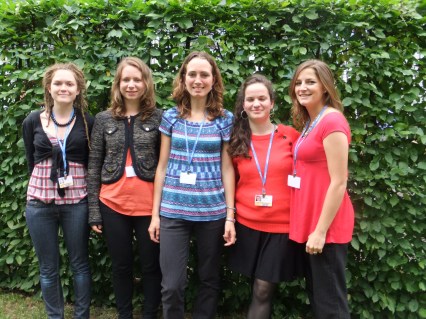Passionate Pragmatism
We are from UNfairplay, a very very small group of young volunteers who try to support under-represented delegations participating in the UNFCCC process. We have done all sorts of things for the delegations we support, from taking minutes, to ‘representing’ Kiribati in shaking the hand of the Cuban Environment Minister. We have also produced a report on the problems that government delegations can have in participating in this mammoth process, you can find it here.
In Bonn we are supporting Kiribati (attending side events, taking minutes etc) and also lobbying the Secretariat and relevant stakeholders to try and take forward our main proposals in the report. This introductory post is written by Sophie, a new-comer to the process, and to UNfairplay, this is her round up of week 1.
- Isabel
Hello from Bonn, I’m Sophie and I’m new to Unfairplay.
Coming along to Bonn as my first involvement in the UNFCCC process has been a steep learning curve.
So what has my experience so far been?
This is a world of acronyms. At time it feels almost like learning a new language. It can be rather confusing, but as with learning a new language, it comes with a buzz as you realise you are slowly starting to get your head around it.
Here’s an update from Unfairplay after the first week of negotiations, and an insight into some of what the team (the 5 of us below) have been up to this week.
Over the first week of the UN Climate Change Conference in Bonn the Secretariat have engaged with civil society groups in various ways.
First, there were participation workshops, to which all parties were asked to contribute. UNfairplay was surprised to find that a number of suggestions along the lines of our webcasts proposals in the report, were also brought forward by other groups. Even more interesting was Bolivia’s statement that the 6million that went into the intercessional in Bangkok, where only the agenda was discussed (i.e there no substantive negotiations on issues on the agenda), should have gone into providing translation facilities for these negotiations. It was a strong statement and one that UNfairplay is also behind, this was full plenary in Bonn last year:
On wednesday, UNfairplay had the amazing opportunity to hand our report to Christiana Figueres, head of the Secretariat, who would have the responsibility for implementing the proposals we are making. She didn’t dismiss us and she acknowledged the importance of the issue we are bringing to the table. At a later session Conny asked what availability of funding for delegates from developing nations existed. Her answer: it doesn’t. And if it did she would give it to the parties without hesitation. What does this mean? It means funding for delegates from developing countries (who usually lack capacity) is reliant on party (i.e country) contributions. The answer: if you belong to a developed nation, lobby your government!
A great example of the team’s input came at a side event on Thursday, in a consultation on the redesign of the UNFCCC website, when a proposal from Unfairplay to improve participation in the process was met with positive response. The suggestion was to use ‘tagging’ within webcasts from the Plenary so people can watch sessions remotely, but specifically have the ability to skip to the part of the video they’d like to see, rather than having to watch the video all the way through. UNfairplay got some great feedback and support from Andrew Ure of the Australian delegation, and chair of some areas of the negotiations, who was very keen on this idea, having a sort of revelation moment as he realised how much easier it would make his job! So, exciting news for that proposal.
This is now being taken forward into a half hour interview with the Secretariat. There is also a survey available, which if you have experience of using the UNFCCC website, please please fill in: http://www.surveymonkey.com/s/G82Q538
As mentioned, the exciting (in this context!) consultation workshop hosted by the Secretariat on Wednesday resulted in a consolidated list of proposals, with a report to follow, on the ideas from civil society in their engagement now being fed back to the UNFCCC process. The hope is of having the ideas fully considered by the parties with the request to adopt the suggestions. Issues raised include language barriers with all meeting being conducted in English and closed meetings where security on the doors at many sessions prevent entry. These, along with proposals, are being passed onto the parties and Unfairplay will continue to follow and participate in this process under YOUNGO.
On a broader note, throughout the negotiations the issues of slow progress and stalling are rife. But wise words came out of a Global Campaign for Climate Action daily briefing with YOUNGO this week; that there are two options in the face of this:
One is to adopt a sense of lethargy.
The other is to continue to work passionately on the solutions, with the hope the process will catch up.
Lets continue with the second option!




About the author
Isabel BottomsIsabel is a student of law at Bristol University, striving to be an environmental lawyer. She's participating in UN Climate talks as part of UNfairplay. She is a director of Dyfydol, a Welsh youth forum on Sustainable Development, and she occasionally blogs here.

